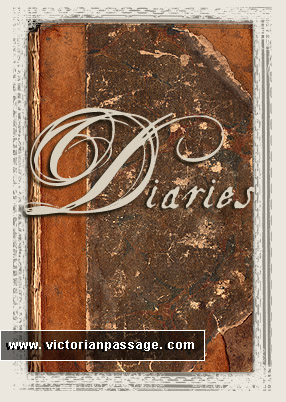Many of our 19th century ancestors kept diaries, scrapbooks or even autograph books. The reasons varied from person to person, but one article on the subject noted that it would be a wise idea to keep a diary of the events that played out. This was true even in the common man [or woman’s] life, since after all “every man’s life is of importance to him and to his“. And just think what a great record would be left for the future generations! As the family “genealogist” this would mean I hit the jackpot if I were to find a diary of my past relatives!
RULES TO DIARY KEEPING
The article shed light on some observations of diary keeping, or suggestions in the proper diary keeping methods. They set out a few rules for when writing your diary.
Rule number one, however, was “one must not attempt too much“. This is because “A country school-teacher, leading a humdrum life in a little village, does not need a diary large enough to set down the doings of court and king; but she will probably find much pleasure in jotting down a brief record of her daily life.”
Rule number two, you don’t have to buy a diary. A blank book will work just fine. Matter of fact a blank book is better so that “the date can be written at the head of each day’s entry. This has the advantage of allowing a long and elaborate entry whenever anything happens to demand it.”
Rule number three, be regular at it for the first year and you should find it a habit to keep up your journal, but only if your entries are brief.
WHAT SHALL WE WRITE ABOUT?
Well to start with ask yourself, as suggested by the article, “What happenings in your life are worth recording?” So you determine what you deem as most important. Some suggestions are the weather, which if you pick up many of the diaries of old they speak primarily about this day to day. They also suggest you speak about who paid you visits or that you paid to others, or letters you have sent or received. It goes on to suggest recording any special payment of money, change in health or making a note of when you began and finished the reading of books.
SAMPLES AND REAL LIFE EXAMPLES
Here the article inserts a couple of brief diary entry samples to get the mental disposition set for diary keeping. Here is the first one:
JAN. 1st, 1883, Monday.
36º, slight snow-storm. Went to Newsboys’ Lodging House.
Sent $50 ck. to Children’s Aid Society. Made eleven calls.
Dined with father.
Read Stedman’s “Poe.”
The above would have been a gentleman’s diary entry.
Here is what a lady’s would be:
APRIL 13th, 1883, Friday.
51º, disagreeable wind. Caught slight cold. Called on Dr.
From Mary; to her. Mrs. Brown called.
Began Aldrich’s “Story of Bad Boy.”
“The words “from Mary; to her,” mean, of course, that a letter was received and answered. “
Of course these are very brief and meager. However there are times when you would expound on an entry, such as when you travel.
I think a lovely and interesting real life example is Louisa Collins’ diary from 1815. She is a young woman who is engaged to be married, from Nova Scotia who provides an interesting window into her simple, but not unlettered, life. You can read her diary here at the Brook House Press.
MORE RESOURCES FOR DIARIES
Now if you want to read some more diaries I have collected a few links for your viewing pleasure. Some may be very old, perhaps you will even one day run across writing from the 18th century. Many times it can be very challenging to read these manuscripts penned so long ago. The website dohistory.org provides some excellent advice when trying to decipher the writing. You can find a collection of very helpful tips and suggestions here, as well as some good background information on reading and writing of the time. Now here are some diary links for you to peruse:
1) http://www.pincumbe.com/burrell/sarahburrell/diary1877.htm
2) http://www.pincumbe.com/burrell/aliceburrell/index.htm
3) http://etext.virginia.edu/toc/modeng/public/KemPlan.html
4) http://www.americancivilwar.com/women/carrie_berry.html

